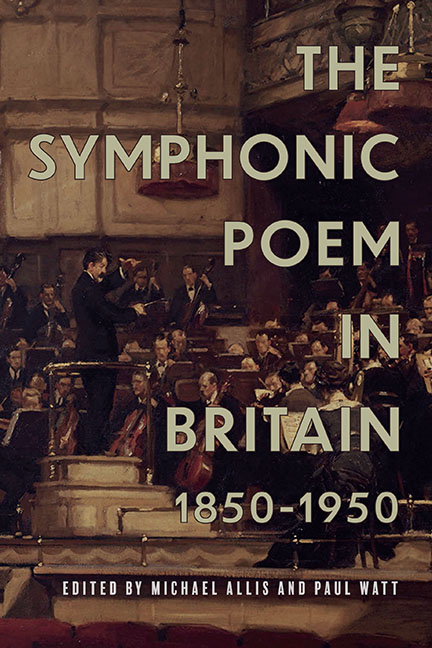1 - Narrative and Formal Plasticity in the British Symphonic Poem, 1850–1950
Published online by Cambridge University Press: 23 October 2020
Summary
❧ Historical Precedents
THE British symphonic poem was, in its first manifestations, inextricably linked with the development of the concert overture. Operatic overtures by such names as Boieldieu, Rossini, Beethoven (particularly his overture to Fidelio and the three Leonora overtures), Cherubini and Weber were popular concert items, as were those from theatrical incidental music such as Beethoven's Coriolan and Egmont. The overture as a form had particular popularity in the German-speaking areas of Europe where, as Bärbel Pelker has demonstrated, a substantial corpus of works was produced between 1825 and 1850. Some of these overtures bore some form of programmatic title or were prefaced by a programme; although the level of detail varied, it was common, as Steven Vande Moortele has shown, for them to adhere to fashionable subcategories with suggestive adjectives such as ‘Tragische’, ‘Geistliche’, ‘Dramatische’, ‘Lustige’. ‘Festival’ overtures were also common, though many were simply labelled ‘Concert Overture’ or even ‘Overture’ in their desire to remain entirely abstract. Mendelssohn's romantic concert overtures, notably A Midsummer Night's Dream (1826), Meerestille und glückliche Fährt (1828), Die Hebriden (1832), Die schöne Melusine (1833) and Ruy Blas (1839), established themselves in the British concert hall during the 1830s and 1840s and brought about change in the overture's status in that they stood alone as symphonic musical forms (invariably but not exclusively emulating a sonata allegro, often preceded by a slow introduction) but were also inspired by external factors such as literature, painting, history and natural landscape pictorially depicted within the musical material. Mendelssohn's Die Hebriden, perhaps the most enduring in the genre, abundantly fulfilled all these criteria, at the same time accentuating a second imperative of a self-contained abstract musical argument defining a single emotional mood, distinct from any sense of programme or narrative.
The overture in England began to gather momentum in the 1830s, much at the same time as Britain's love affair with Mendelssohn was ignited by the composer's visits to England and Scotland. A concentration of concert overtures – Anthony and Cleopatra (1835), Cymbeline (1836) and The Tempest (1837) by Cipriani Potter (1792–1871), The Merchant of Venice (1834) and Romeo and Juliet (1836) by George Macfarren (1813–1887) and The Tempest (1832) and The Merry Wives of Windsor (1834) by William Sterndale Bennett (1816–1875) – pointed to the importance of Shakespeare, symptomatic of the playwright's nineteenth-century revival.
- Type
- Chapter
- Information
- The Symphonic Poem in Britain, 1850–1950 , pp. 15 - 54Publisher: Boydell & BrewerPrint publication year: 2020



